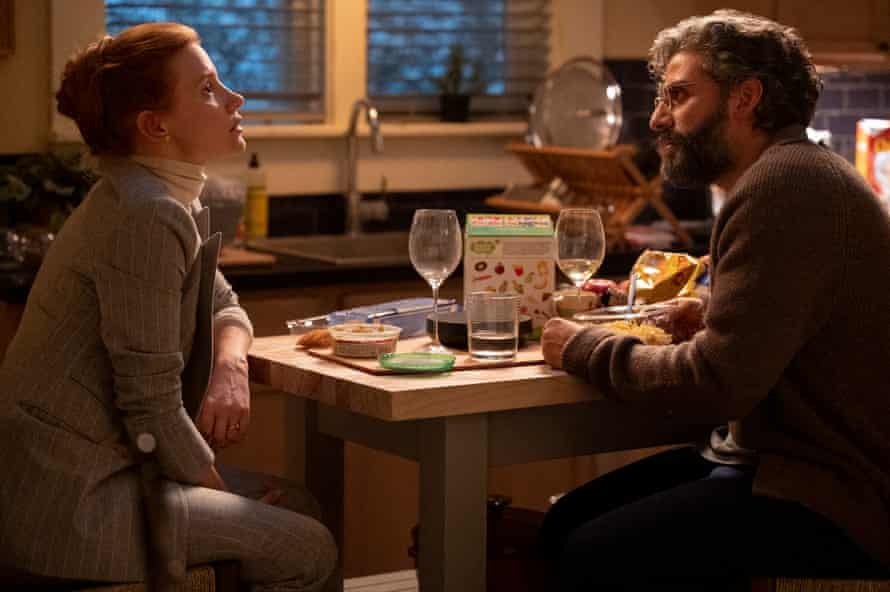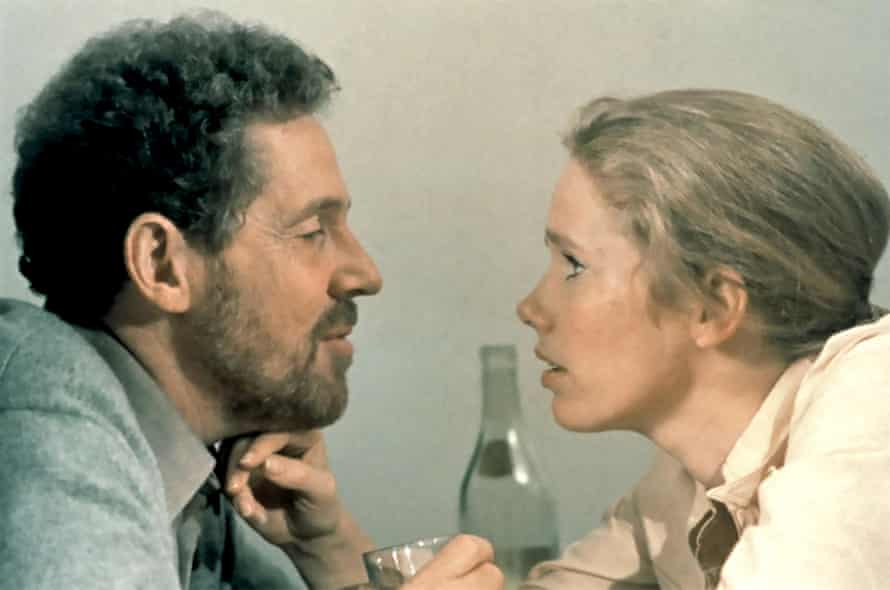How Long Till Voting Rf Olympic Again
I n 1973, Ingmar Bergman released Scenes from a Marriage. The seminal Swedish Television receiver series saw a luminous Liv Ullmann and a tortured Erland Josephson play Marianne and Johan, whose marriage is deliquescing with the most elegant ugliness. Their pain is exquisite and their liberation hard-won, but it is – in the end – a victory for authenticity. For these perfect people are trapped by convention.
"It was very political and very revolutionary," says Hagai Levi, the Israeli director who has simply remade the series for HBO, with Jessica Chastain and Oscar Isaac in the lead roles. "And very outrageous! Back then, even the word 'divorce' was shocking." In Bergman'south series, the couple are crushed by the weight of their own seeming perfection, the relinquishment of which makes information technology feel then emancipating, and so novel. This was not an Ibsen rehash, a Doll's House bulletin ("it's OK to leave bad people") but something much more seismic, in the 70s at least. Even though Johan is the jerk who takes off, the signal is: sometimes neither political party is bad – they are simply not themselves until they role.
Information technology was turned into a flick, won numerous awards and became a conservative bugbear, responsible for spiking divorce rates in Sweden and across Europe. Tin can a moving picture have such an touch? Or is picture palace not then much a driver as an iteration of changing norms? My parents split upwards effectually this time, 1976. I find it tickling to imagine my mum'due south confront if my dad had tried to stick it on Ingmar Bergman.
Undeniable, though, was its influence: from Woody Allen'southward Husbands and Wives to Richard Linklater'southward Earlier Midnight, subsequent films most couples used it every bit a staple. Bergman likewise haunts many contempo projects, such as Noah Baumbach's Marriage Story and Sam Levinson's explosive Malcolm & Marie. Yet this is the first time a director has used Bergman's masterpiece as a blueprint, and remade it, "keeping to the structure of every scene", as Levi explains. Even so, the conclusion has never been more different.

Speaking from Tel Aviv, Levi tells me he kept the construction, but never intended to stick to the original script, and the new series opens with a beautifully awkward exchange. Mira, played with painful intensity by Chastain, and Jonathan, played past Isaac, are interviewed past a PhD student well-nigh their spousal relationship. They're asked to give their pronouns. "He, him, his," says Isaac with the gusto of a man happy to continue up with the times. "She," Chastain tentatively begins, and her hubby fills in "her, hers" over the top. Ah, you think, nosotros're in manifestly-sensitive-married man-is-really-an-arsehole territory. But that's not where we are at all.
Both performances are intense, only the hurt on Isaac'due south face as Chastain pulls away from him – the shadow of his terror as he eats spaghetti and thinks he sees disgust in her eyes – is then pin-authentic I had to wait away. Rumour has it that Chastain, at least, cried every day on set. Each episode begins with a backside-the-scenes tracking shot, clapper boards and decorated people. "I did that," Levi says, "to show that it'due south much more abstract than this specific couple. Information technology's a phase, these are actors." The backstage conceit invites you to put yourselves in their shoes – though I would sincerely propose yous not to.
Chastain is the one to leave, "and the moment I had her leaving, immediately I felt closer to her," Levi recalls. "I felt I understood her agony and her need." But if he'due south flipped the gender dynamic – Mira is the bolter and the breadwinner, Jonathan theconstant, and the caregiver – Levi has also reversed something much more than primal. "If Bergman spoke near the price of matrimony, he wanted to say, basically, wedlock kills dearest. I want to speak about the toll of separation. I don't think nosotros speak enough about how hard it is and traumatic information technology is to separate."
The work of sociologist Eva Illouz made him think differently well-nigh the cost of splitting up. "I had been divorced twice, [but] I hadn't been thinking much about that traumatic side of separation and divorce until reading [Illouz's book] The End of Love," he says. "How it affects you both psychologically and physically, how difficult it makes it to trust and beloved again, how long it takes to recover."
Of form a 2021 exploration of marriage would be different; the institution has changed. Every bit Levi says, "I retrieve when you enter a wedlock right now, yous know already that it'south conditional. The contract is no longer final. Nosotros're together until ane of us feels it's not for them any more. Both characters …" – he corrects himself, laughing – "sorry, both people know it could be temporary." The logical underpinning of that – can you possibly make a lifelong promise if y'all're prioritising the search for yourself? – is explored in the "bad spousal relationship" of the piece. Mira and Jonathan are, for a while at least, the "perfect" couple – happy parents, with their loftier-spec kitchen and their super-respectful, discursive tone.
The pair have two friends, conceived every bit a counterpoint. In Levi'due south version, Kate and Peter are a polyamorous couple with kids. Kate's boyfriend has finished with her, and Peter is sulking that she had one in the commencement identify (information technology seems apposite to note that he started information technology, with the polyamory). "Kate says she feels very proud that her children can actually encounter her looking for her own happiness and self-actualisation," Levi says. "I wrote that in a very ironic way, just information technology was perceived [by reviewers] as a very honest, and very nice monologue, very convincing."

We return to The End of Love, "a vivid analysis of the connectedness betwixt capitalism and relationships. [Illouz] quotes a woman saying this exact sentence, 'should I be loyal to this human being or loyal to my truth? Of form I would choose the 2d.' Which is amazing!"
The pursuit of happiness lays waste all relationships in Levi's Scenes from a Union, whether monogamous or not. Self-fulfilment is another wheel on the charabanc of consumerism, a kind of mindless gratification. "You lot change your iPhone, y'all're encouraged to look for the new," says Levi. "Why wouldn't marriage exist role of that? Why shouldn't I look for a better model?"
Levi's conclusions are quite un-American, and so: is happiness the thing to pursue? He recognises this in surprise, having had a decades-long career in both Israel and the US, previously porting ideas from one to the other with ease. The conceit for BeTipul, Levi'south drama in which a psychologist sees a changing cast of patients, was seamlessly transposed to some other HBO series, In Handling. He lands on something disorientating about his Scenes from a Marriage: that fifty-fifty while it is obviously an American production, with an American cast, it has a European sensibility. "For me, it's American," he says, "for you lot it'south American. For them it's not American enough".
Rather, it is somewhere between the two, with the influence of the original – the new show was instigated by Bergman'south son – combining with Levi's formative screen experiences to create something powerfully recognisable. "Throughout my teenage years and 20s [he was born in 1963], nosotros only one public TV channel in Israel, and I guess they didn't have enough money to buy American shows. We had a lot of British television. The Singing Detective! Dennis Potter was my god."
As for the aesthetic, he describes the original as "almost ugly, [Bergman'southward] cinematographer e'er chosen information technology his most ugly work," says Levi. "It wasn't that I wanted to make it more than beautiful per se, but I had more money …" The principal visual deviation is that his series takes place entirely in Mira and Jonathan's house, with a hyper-realism that recalls a later Scandinavian movement, Dogme, a manifesto of strict rules for radical experiment every bit pioneered in the 90s by Lars von Trier and Thomas Vinterberg.
"Information technology'due south helpful for me to have rules," the director says. "To say, this is your field of play, and so be complimentary within those boundaries. Probably besides because I was religious myself. Until the age of 20, I was orthodox Jew". His background is echoed in his hero, Jonathan, who was an Orthodox Jew growing up and holds his lost faith as key to his identity. Lost religion and the residual of rules loom over the pursuit-of-happiness creed that Levi describes, as per Illouz, equally our "shallow freedom."
You might reasonably expect Scenes from a Marriage to be a remake, a respectful modernisation of the original. But the exact opposite is truthful. If Bergman smashed convention, Levi sifts through the smithereens, constantly lacerating himself and us, figuring out what could be salvaged, and what should never have been broken. Information technology would be a reach to say it may herald a global spike in people getting back together. Simply it's devastating, bewitching and – bizarrely – as original as the original.
Scenes from a Marriage begins in the UK on Sky Atlantic/At present on 11 October
martinbehearring1978.blogspot.com
Source: https://www.theguardian.com/tv-and-radio/2021/oct/08/you-upgrade-your-phone-why-not-your-marriage-the-tv-show-set-to-send-divorce-rates-soaring
Post a Comment for "How Long Till Voting Rf Olympic Again"